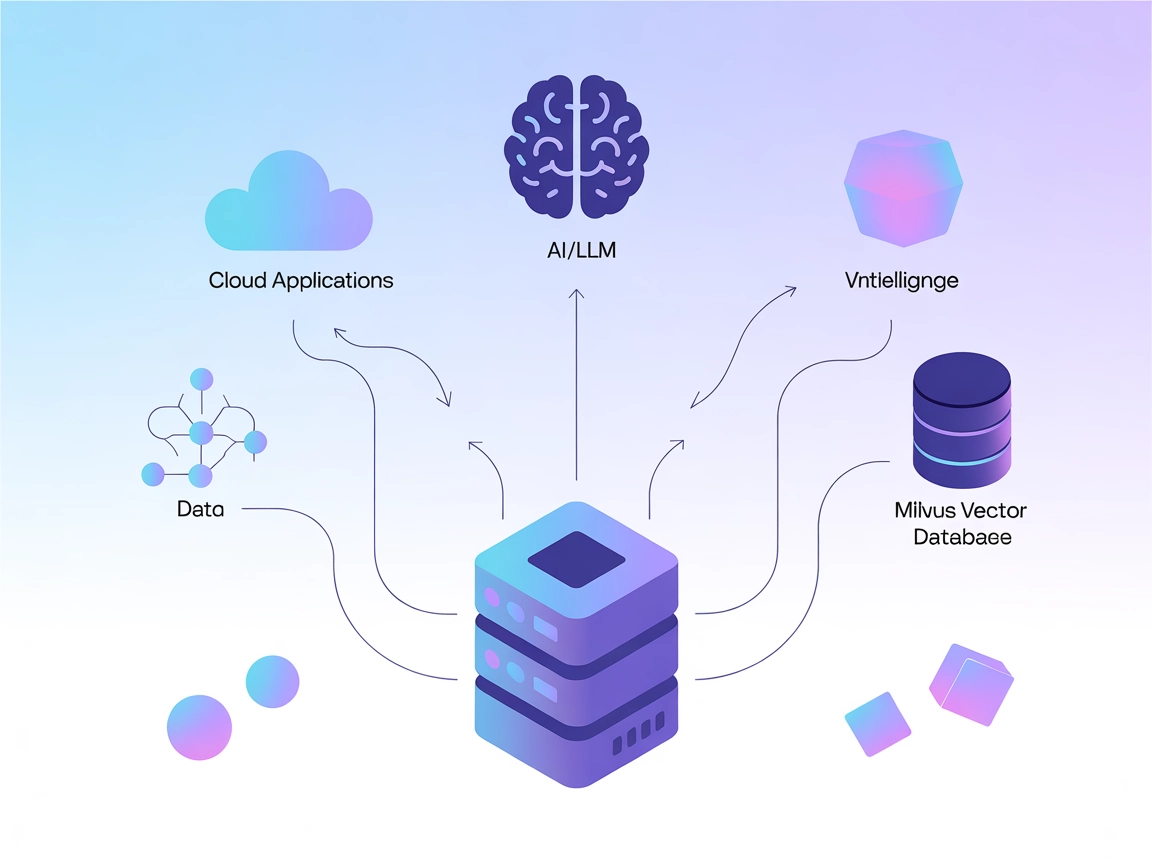
ModelContextProtocol (MCP) Server Integration
The ModelContextProtocol (MCP) Server acts as a bridge between AI agents and external data sources, APIs, and services, enabling FlowHunt users to build context...

Connect LLMs and AI agents to Milvus for powerful vector search, contextual memory, and data-driven recommendations directly in your FlowHunt workflows.
FlowHunt provides an additional security layer between your internal systems and AI tools, giving you granular control over which tools are accessible from your MCP servers. MCP servers hosted in our infrastructure can be seamlessly integrated with FlowHunt's chatbot as well as popular AI platforms like ChatGPT, Claude, and various AI editors.
The Milvus MCP (Model Context Protocol) Server connects AI assistants and LLM-powered applications with the Milvus vector database. This enables seamless interaction between language models and large-scale vector data, providing a standardized way to access, query, and manage Milvus from within AI workflows. Using the Milvus MCP Server, developers can integrate Milvus-based search, retrieval, and data management capabilities directly into their AI agents, IDEs, or chat interfaces. The server supports multiple communication modes (stdio and Server-Sent Events), allowing it to fit diverse deployment scenarios and development environments. By bridging LLMs and Milvus, it greatly enhances the ability of AI systems to perform context-aware operations on high-dimensional data, unlocking richer and more intelligent LLM-powered experiences.
No information about prompt templates is provided in the repository.
No explicit list of Model Context Protocol “resources” is described in the available documentation or code.
No explicit tool list or function names are documented in the available documentation or code files, including server.py.
git clone https://github.com/zilliztech/mcp-server-milvus.gituv run src/mcp_server_milvus/server.py --milvus-uri http://localhost:19530{
"mcpServers": {
"milvus-mcp": {
"command": "uv",
"args": ["run", "src/mcp_server_milvus/server.py", "--milvus-uri", "http://localhost:19530"]
}
}
}
Securing API keys:
If the server requires sensitive info, use environment variables:
{
"env": {
"MILVUS_URI": "http://localhost:19530"
},
"inputs": {}
}
{
"mcpServers": {
"milvus-mcp": {
"command": "uv",
"args": ["run", "src/mcp_server_milvus/server.py", "--milvus-uri", "http://localhost:19530"]
}
}
}
Secure credentials via environment variables as above.
uv.uv run src/mcp_server_milvus/server.py --milvus-uri http://localhost:19530{
"mcpServers": {
"milvus-mcp": {
"command": "uv",
"args": ["run", "src/mcp_server_milvus/server.py", "--milvus-uri", "http://localhost:19530"]
}
}
}
Securing API keys:
Use environment variables as shown above.
uv.{
"mcpServers": {
"milvus-mcp": {
"command": "uv",
"args": ["run", "src/mcp_server_milvus/server.py", "--milvus-uri", "http://localhost:19530"]
}
}
}
Environment variables:
{
"env": {
"MILVUS_URI": "http://localhost:19530"
}
}
Using MCP in FlowHunt
To integrate MCP servers into your FlowHunt workflow, start by adding the MCP component to your flow and connecting it to your AI agent:

Click on the MCP component to open the configuration panel. In the system MCP configuration section, insert your MCP server details using this JSON format:
{
"milvus-mcp": {
"transport": "streamable_http",
"url": "https://yourmcpserver.example/pathtothemcp/url"
}
}
Once configured, the AI agent is now able to use this MCP as a tool with access to all its functions and capabilities. Remember to change “milvus-mcp” to whatever the actual name of your MCP server is and replace the URL with your own MCP server URL.
| Section | Availability | Details/Notes |
|---|---|---|
| Overview | ✅ | |
| List of Prompts | ⛔ | No prompt templates documented |
| List of Resources | ⛔ | No explicit MCP resource list |
| List of Tools | ⛔ | No explicit tools listed in available files |
| Securing API Keys | ✅ | Uses environment variables, documented in setup examples |
| Sampling Support (less important in evaluation) | ⛔ | Not mentioned |
Roots support: Not mentioned
Sampling support: Not mentioned
The Milvus MCP Server is a practical and focused bridge for connecting LLMs with Milvus, with clear setup guides for popular dev tools. However, its documentation lacks detail on MCP resources, prompts, and actionable tool APIs, which limits out-of-the-box discoverability. Still, it’s a solid foundation for vector-based AI integrations.
| Has a LICENSE | ✅ (Apache-2.0) |
|---|---|
| Has at least one tool | ⛔ |
| Number of Forks | 32 |
| Number of Stars | 139 |
Overall: 4/10
The server is useful for its niche but would benefit greatly from more explicit documentation on resources, prompt templates, and tool APIs for maximal interoperability and ease of use.
The Milvus MCP Server bridges AI assistants and LLM applications with the Milvus vector database, enabling seamless vector search, contextual memory, and data management for advanced AI workflows.
Key use cases include vector search, embedding management, contextual chatbot memory, AI-powered recommendations, and real-time data analysis using Milvus within FlowHunt.
Use environment variables (e.g., MILVUS_URI) to store sensitive connection info, as shown in the setup guides for each supported client.
No explicit prompt templates or tool APIs are documented. The server focuses on providing a bridge for vector operations and embedding management.
It is a solid foundation for connecting LLMs to vector databases, with clear setup instructions, but would benefit from more documentation on prompt and tool APIs for easier discoverability and integration.
Enhance your AI agents with seamless access to vector databases, enabling smarter search, recommendations, and contextual memory. Integrate the Milvus MCP Server with FlowHunt now!

The ModelContextProtocol (MCP) Server acts as a bridge between AI agents and external data sources, APIs, and services, enabling FlowHunt users to build context...

The Litmus MCP Server enables seamless integration between Large Language Models (LLMs) and Litmus Edge for industrial device configuration, monitoring, and man...

The Model Context Protocol (MCP) Server bridges AI assistants with external data sources, APIs, and services, enabling streamlined integration of complex workfl...
Cookie Consent
We use cookies to enhance your browsing experience and analyze our traffic. See our privacy policy.